Search Thermo Fisher Scientific
Correlative Electron Microscopy Software
Thermo Scientific Maps Software is an imaging and correlative workflow software suite compatible with the full line of Thermo Scientific SEM, DualBeam (FIB SEM) and TEM platforms.
Scientists and researchers rely increasingly on nanoscale observations to inform the latest advances in research and analysis. It has, however, become apparent that high-resolution observations lose much of their utility in the absence of the larger macroscopic context. Observations from multiple sources must be linked, providing the necessary multi-scale and multi-modal insight for truly valuable data.
Maps Software provides a powerful imaging workflow automation package within an easy-to-use and robust platform. With just a few clicks, you can collect impactful data while preserving the context of your observations.
Multi-scale imaging automation
Whether its scanning electron microscopy analysis in SEM and DualBeam tools or transmission electron microscopy (TEM), Maps Software enables automated 2D imaging for a variety of applications, from acquiring large image mosaics to scheduling routine imaging tasks for off times (overnight, weekends).
- Acquire up to four simultaneous signals, automatically (STEM/SEM)
- Run multiple samples in series to increase system productivity
- Choose rectangular, circular or custom shapes for mapping acquisition (STEM/SEM)

Correlative microscopy
With the ability to correlate optical and electron microscope data and easy navigation from SEM to TEM, Maps Software allows you to obtain the necessary context that drives your research and development. Use multi-modal data to aid in interpretation and navigation, ensuring you are always collecting the right data from the right location.
- Import 2D and 3D data from any source
- Quickly generate context for the entire sample grid or targeted region of interest
- Register imagery from other modalities (e.g. energy-dispersive spectroscopy, secondary electron signal, electron backscatter diffraction, etc.)
- Integrate observations in a multi-scale, multi-layered visualization environment
- Align data with system stages using any Thermo Scientific EM platform
Integrated analytics
Maps Software supports integrated EDS map acquisition on STEM platforms for chemical characterization and elemental analysis along with your high-resolution imaging.
- Automate large-area, high-throughput EDS acquisition with the Thermo Scientific Super-X and Dual-X Detector Systems
- Enable native correlation with electron imaging layers
- Employ built-in stitching and multiscale visualization
- Easily view EDS maps away from the microscope with the optional offline version of Maps Software
Intuitive visualization and offline collaboration
The optional offline version of Maps Software lets you take the microscope with you when you are away from the lab.
- View your data from your own PC
- Access the full correlative power of Maps Software anywhere
- Plan for your next imaging session before you head to the lab
- Easily share your multi-scale observations with colleagues
Avizo Software integration
The addition of Thermo Scientific Avizo Software automates your image processing and statistical data generation. Avizo Software provides a rich, integrated user experience that blends acquisition with advanced analysis, and works in the background to process images as they are acquired.
- Gain instant access to critical statistical data through a complete, automated imaging and analysis solution
- Perform advanced image processing, accessible while you are on the tool
- Tune and optimize imaging and processing workflows

- Compatibility with current Thermo Scientific SEM, FIB-SEM, and TEM platforms; providing a unified user experience across all instrument types.
- Integrated approach to data acquisition, annotation and storage.
- Automated acquisition of large overviews at any magnification (tile and stitch); multiple acquisitions can be set up for unsupervised batch data collection.
- Setup and coordination of experiments across multiple microscopes.
- Correlation of images from different microscopes, including imported images from 3rd party instruments using the integrated Bio-Formats Library.
Multi-scale imaging automation
A completely automated solution for generating high-quality, multi-scale images.
Correlative microscopy
Gain insight by integrating observations across modalities and imaging platforms.
Integrated analytics
Make EDS mapping easier and instantly valuable via direct acquisition and integration of elemental layers.
Intuitive visualization and offline collaboration
The optional offline version of Maps Software allows you to continue your investigation and plan your next imaging session while away from the microscope.
Maps offline viewer
This free, standalone application allows you to view Maps project from your PC (Windows 7 or 10). After installation, simply launch the application and import your projects for viewing.
Maps Offline Viewer allows you to open Maps projects on any PC. It also allows easier sharing of results without requiring a licensed version of Maps. Note that the viewer does not, however, allow processing steps like stitching, etc.
Download Maps offline viewer v3 ›
For users with images created using Maps version 3.0 or higher
Download Maps offline viewer v2 ›
For users with images created using Maps version 2.5 or lower
Webinar: Boost Productivity in Multi-Scale and Multi-Modal Material Analysis Challenges
In this webinar, you will:
- Discover the beauty of high-resolution images in a larger context.
- Learn how Maps Software efficiently handles a large number of samples at the same time.
- See how data from different sources is combined to answer questions no individual technique can answer.
- Learn how Maps Software handles navigation, alignment and correlation in practice.
- Understand how sharp images can be acquired without an operator being present.
- Find out how Maps Software can function as a powerful “virtual SEM”.
- Discover what sharing images and data looks like to your collaborators.
Webinar: Boost Productivity in Multi-Scale and Multi-Modal Material Analysis Challenges
In this webinar, you will:
- Discover the beauty of high-resolution images in a larger context.
- Learn how Maps Software efficiently handles a large number of samples at the same time.
- See how data from different sources is combined to answer questions no individual technique can answer.
- Learn how Maps Software handles navigation, alignment and correlation in practice.
- Understand how sharp images can be acquired without an operator being present.
- Find out how Maps Software can function as a powerful “virtual SEM”.
- Discover what sharing images and data looks like to your collaborators.
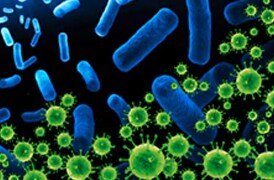
Infectious Disease Research
Cryo-EM techniques enable multiscale observations of 3D biological structures in their near-native states, informing faster, more efficient development of therapeutics.

Drug Discovery
Learn how to take advantage of rational drug design for many major drug target classes, leading to best-in-class drugs.
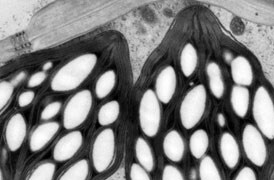
Plant Biology Research
Fundamental plant biology research is enabled by cryo electron microscopy, which provides information on proteins (with single particle analysis), to their cellular context (with tomography), all the way up to the overall structure of the plant (large volume analysis).

Pathology Research
Transmission electron microscopy (TEM) is used when the nature of the disease cannot be established via alternative methods. With nano-biological imaging, TEM provides accurate and reliable insight for certain pathologies.
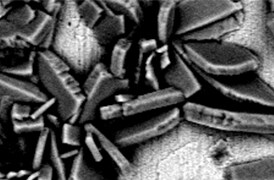
Process control using electron microscopy
Modern industry demands high throughput with superior quality, a balance that is maintained through robust process control. SEM and TEM tools with dedicated automation software provide rapid, multi-scale information for process monitoring and improvement.
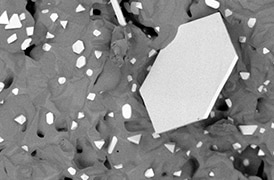
Quality control and failure analysis
Quality control and assurance are essential in modern industry. We offer a range of EM and spectroscopy tools for multi-scale and multi-modal analysis of defects, allowing you to make reliable and informed decisions for process control and improvement.
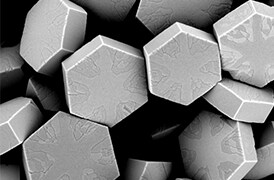
Fundamental Materials Research
Novel materials are investigated at increasingly smaller scales for maximum control of their physical and chemical properties. Electron microscopy provides researchers with key insight into a wide variety of material characteristics at the micro- to nano-scale.
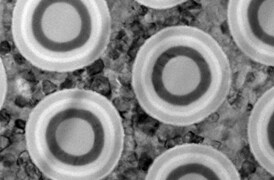
Semiconductor Pathfinding and Research
Advanced electron microscopy, focused ion beam, and associated analytical techniques for identifying viable solutions and design methods for the fabrication of high-performance semiconductor devices.
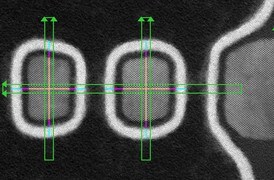
Yield Ramp and Metrology
We offer advanced analytical capabilities for defect analysis, metrology, and process control, designed to help increase productivity and improve yield across a range of semiconductor applications and devices.
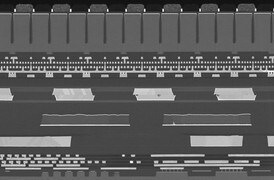
Semiconductor Failure Analysis
Increasingly complex semiconductor device structures result in more places for failure-inducing defects to hide. Our next-generation workflows help you localize and characterize subtle electrical issues that affect yield, performance, and reliability.

Physical and Chemical Characterization
Ongoing consumer demand drives the creation of smaller, faster, and cheaper electronic devices. Their production relies on high-productivity instruments and workflows that image, analyze, and characterize a broad range of semiconductor and display devices.

Single Particle Analysis
Single particle analysis (SPA) is a cryo-electron microscopy technique that enables structural characterization at near-atomic resolutions, unraveling dynamic biological processes and the structure of biomolecular complexes/assemblies.

Cryo-Tomography
Cryo-electron tomography (cryo-ET) delivers both structural information about individual proteins as well as their spatial arrangements within the cell. This makes it a truly unique technique and also explains why the method has such an enormous potential for cell biology. Cryo-ET can bridge the gap between light microscopy and near-atomic-resolution techniques like single-particle analysis.

MicroED
MicroED is an exciting new technique with applications in the structural determination of small molecules and protein. With this method, atomic details can be extracted from individual nanocrystals (<200 nm in size), even in a heterogeneous mixture.

Particle analysis
Particle analysis plays a vital role in nanomaterials research and quality control. The nanometer-scale resolution and superior imaging of electron microscopy can be combined with specialized software for rapid characterization of powders and particles.
_Technique_800x375_144DPI.jpg)
3D EDS Tomography
Modern materials research is increasingly reliant on nanoscale analysis in three dimensions. 3D characterization, including compositional data for full chemical and structural context, is possible with 3D EM and energy dispersive X-ray spectroscopy.
_Technique_800x375_144DPI.jpg)
EDS Elemental Analysis
Thermo Scientific Phenom Elemental Mapping Software provides fast and reliable information on the distribution of chemical elements within a sample.
Semiconductor TEM Imaging and Analysis
Thermo Scientific transmission electron microscopes offer high-resolution imaging and analysis of semiconductor devices, enabling manufacturers to calibrate toolsets, diagnose failure mechanisms, and optimize overall process yields.
Semiconductor Analysis and Imaging
Thermo Fisher Scientific offers scanning electron microscopes for every function of a semiconductor lab, from general imaging tasks to advanced failure analysis techniques requiring precise voltage-contrast measurements.

The Automated NanoParticle Workflow (APW) is a transmission electron microscope workflow for nanoparticle analysis, offering large area, high resolution imaging and data acquisition at the nanoscale, with on-the-fly processing.

Single Particle Analysis
Single particle analysis (SPA) is a cryo-electron microscopy technique that enables structural characterization at near-atomic resolutions, unraveling dynamic biological processes and the structure of biomolecular complexes/assemblies.

Cryo-Tomography
Cryo-electron tomography (cryo-ET) delivers both structural information about individual proteins as well as their spatial arrangements within the cell. This makes it a truly unique technique and also explains why the method has such an enormous potential for cell biology. Cryo-ET can bridge the gap between light microscopy and near-atomic-resolution techniques like single-particle analysis.

MicroED
MicroED is an exciting new technique with applications in the structural determination of small molecules and protein. With this method, atomic details can be extracted from individual nanocrystals (<200 nm in size), even in a heterogeneous mixture.

Particle analysis
Particle analysis plays a vital role in nanomaterials research and quality control. The nanometer-scale resolution and superior imaging of electron microscopy can be combined with specialized software for rapid characterization of powders and particles.
_Technique_800x375_144DPI.jpg)
3D EDS Tomography
Modern materials research is increasingly reliant on nanoscale analysis in three dimensions. 3D characterization, including compositional data for full chemical and structural context, is possible with 3D EM and energy dispersive X-ray spectroscopy.
_Technique_800x375_144DPI.jpg)
EDS Elemental Analysis
Thermo Scientific Phenom Elemental Mapping Software provides fast and reliable information on the distribution of chemical elements within a sample.
Semiconductor TEM Imaging and Analysis
Thermo Scientific transmission electron microscopes offer high-resolution imaging and analysis of semiconductor devices, enabling manufacturers to calibrate toolsets, diagnose failure mechanisms, and optimize overall process yields.
Semiconductor Analysis and Imaging
Thermo Fisher Scientific offers scanning electron microscopes for every function of a semiconductor lab, from general imaging tasks to advanced failure analysis techniques requiring precise voltage-contrast measurements.

The Automated NanoParticle Workflow (APW) is a transmission electron microscope workflow for nanoparticle analysis, offering large area, high resolution imaging and data acquisition at the nanoscale, with on-the-fly processing.
Electron microscopy services
To ensure optimal system performance, we provide you access to a world-class network of field service experts, technical support, and certified spare parts.






